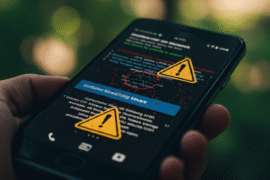This article may contain references to products or services from one or more of our advertisers or partners. We may receive compensation when you click on links to those products or services. Nonetheless, our opinions are our own.

Updated by Albert Fang
Cyber threats loom larger and more complex than ever. Cybersecurity professionals find themselves in a relentless cycle of detecting, responding, and recovering from cyberattacks. Did you know that nearly 4000 new cyber attacks occur daily? This staggering number brings the need for robust security systems and this is when AI comes in.
This blog post explores the role of AI-powered systems in cybersecurity pointing at how they enhance security level within your organization reducing the burden on your IT team and adding to flexibility of your defense.
Threat Detection and Analysis
It takes roughly 9 months or 277 days for companies to detect and report data breach – states the 2022 IBM report. Stolen or compromised credentials were among the most common and most hard-to-detect cases of cyberattacks. This type of cyberattack took nearly 327 days to identify. The speed of response depends on how automated the cybersecurity system is. Therefore, banks and other fintech companies that implement ML (machine learning) – a branch of AI – can reduce the time it takes to detect an attack to a few hours. ML systems analyze patterns and behavior to predict and identify potential threats before they happen.
Automation of Routine Security Tasks
AI can automate many routine security tasks such as software patching and updating, malware detection, and firewall management to reduce the burden on your security team and let them focus on more complex issues. For instance, AI systems can predict potential attack vectors based on historical data and emerging trends. In addition, AI systems monitor user behavior patterns, devices, or networks to detect unusual activities that may indicate a threat. This, apart from saving valuable human resources, leads to empowered decision-making and allows for proactive decision-making.
Flexibility in Defense Systems
Hackers never sleep looking for more intricate ways to compromise your business’ peaceful environment. Thus, cyberattacks become more sophisticated, targeted, and widespread. 69% of small to medium businesses state that cyberattacks are becoming more targeted, while 45% point to the ineffectiveness of their systems at mitigating attacks. Cyberattacks are constantly evolving, and thus require defense systems to adapt accordingly. AI-powered digital defense tools, with their capacity to learn and adjust to novel attacks, allow companies to identify and tackle emerging threats – even without human intervention.
Encryption Advantage
AI gives a significant advantage in encryption, which is one of the primary defense tools against cyber threats. AI algorithms can generate complex encryption keys like AES и SHA making them difficult for cybercriminals to decode and crack. Encryption keys are used to convert information into an unreadable format that only can be accessed with the special decryption key – thus enhancing the protection of data against unauthorized access
To sum up, the importance of AI capabilities in digital defense is non-negotiable. Integration of Artificial Intelligence in cybersecurity leads to quality thread detection, quality threat analysis, automation of routine tasks, adaptiveness of defense systems, and more robust data encryption opportunities. The abovementioned factors, enhanced by the efforts of companies like S-PRO, create a more resilient barrier in the ever-evolving world of cyberattacks.

Reviewed and edited by Albert Fang.
See a typo or want to suggest an edit/revision to the content? Use the contact us form to provide feedback.
At FangWallet, we value editorial integrity and open collaboration in curating quality content for readers to enjoy. Much appreciated for the assist.
Did you like our article and find it insightful? We encourage sharing the article link with family and friends to benefit as well - better yet, sharing on social media. Thank you for the support! 🍉
Article Title: How AI Helps to Battle Cybersecurity Threats
https://fangwallet.com/2024/02/07/how-ai-helps-to-battle-cybersecurity-threats/The FangWallet Promise
FangWallet is an editorially independent resource - founded on breaking down challenging financial concepts for anyone to understand since 2014. While we adhere to editorial integrity, note that this post may contain references to products from our partners.
The FangWallet promise is always to have your best interest in mind and be transparent and honest about the financial picture.
Become an Insider

Subscribe to get a free daily budget planner printable to help get your money on track!
Make passive money the right way. No spam.
Editorial Disclaimer: The editorial content on this page is not provided by any of the companies mentioned. The opinions expressed here are the author's alone.
The content of this website is for informational purposes only and does not represent investment advice, or an offer or solicitation to buy or sell any security, investment, or product. Investors are encouraged to do their own due diligence, and, if necessary, consult professional advising before making any investment decisions. Investing involves a high degree of risk, and financial losses may occur including the potential loss of principal.
Source Citation References:
+ Inspo
There are no additional citations or references to note for this article at this time.












































